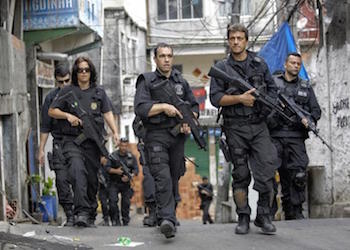A recent ruling from the Inter-American Court of Human Rights (IACHR) marks the first time the court has condemned Brazil for police violence, in a decades-old case that highlights ongoing institutional failures among Rio de Janeiro’s security forces.
The IACHR ruling, announced May 12, is related to two separate incidents that took place in October 1994 and May 1995 in Rio’s Complexo do Alemão neighborhood, in which police officers raped three women and killed 26 people.
Dubbed the “Nova Brasília” massacres, more than 20 years has gone by without justice being served for the victims, the court found. The ruling holds Brazil responsible for failing to properly investigate and punish those who committed these crimes.
This marks the first time Brazil has been condemned by the IACHR for police violence, according to the Brazilian government news service Agência Brasil.
The case was brought by two non-governmental organizations, the Center for Justice and International Law (CEJIL) and the Institute for Religous Studies (Instituto de Estudos da Religião – ISER).
Beatriz Affonso, director of CEJIL’s Brazil program, said in a statement that “the ruling recognizes that the violence perpetrated by the public security agents of the state of Rio de Janeiro occurs systematically, and is frequently aided by omissions made by justice administrators.”
Amnesty International also released a statement praising the ruling, which noted that the court had ordered that “investigations into both massacres should be re-opened and the victims and their families adequately compensated and protected.”
In addition, the court ruled that Brazil “must publish an annual report with data on deaths resulting from police intervention across the country and establish goals and policies for reducing violence and police killings in Rio de Janeiro,” Amnesty wrote.
“This judgement shines a long overdue light on the appalling human rights violations perpetrated by Rio’s police force against young, poor, black individuals who were unarmed,” Jurema Werneck, executive director of Amnesty International Brazil, said in the statement.
“It’s been 20 years since the Nova Brasília massacres and so far no one has been held responsible for the homicides or the sexual violence perpetrated. This impunity fuels the rampant police violence that we are still witnessing on Rio’s streets today,” Werneck added.
The government will now have one year, until May 11, 2018, to reopen the investigations and pay compensation to about 80 people who were affected by the massacres in order to comply with the ruling, according to Agência Brasil.
CEJIL’s Affonso told Agência Brasil that the expectation is that the Brazilian government will be able to quickly comply with the court’s decision.
InSight Crime Analysis
The ruling from the IACHR against police forces in Rio de Janeiro comes as police in the city are under increased scrutiny amid growing violence. And while it is unclear what exactly this specific case will mean in the long run, it adds to mounting international condemnation about the longstanding issue of brutality within Rio de Janeiro’s police force.
Earlier this year, it was reported that the city’s police are continuing to use lethal force at high rates. Brazil’s Institute for Public Security (Instituto de Segurança Pública – ISP) found that Rio de Janeiro’s police forces had killed 84 people in February, which marked a 71 percent increase from February 2016, when they killed 49 people.
Since January 2016, killings by police in Rio de Janeiro have generally increased, peaking in December 2016 with 105 killings. Cases of excessive use of force by police in Brazil often go unpunished.
SEE ALSO: Brazil News and Profile
However, this pattern of abuse and impunity underscored by the IACHR ruling last week sheds light on broader institutional failures.
While Rio de Janeiro’s police forces have killed a record number of people recently, they have also been killed themselves at a record rate in 2017. As of April, 51 police officers were killed in Rio de Janeiro so far this year. Since the statistic began being recorded 23 years ago, this is the highest number ever recorded.
This trend could be a reflection of the poor training Brazilian police typically recieve, combined with a flawed overall security strategy that prioritizes heavy-handed tactics over potentially more effective social development and community policing initiatives.
SEE ALSO: Coverage of Police Reform
Nevertheless, it appears that increased militarization will continue to be the response to upticks in violence in Rio de Janeiro. The federal government this week authorized 300 new agents from the Brazilian National Security Force to join some 125 agents already patrolling the city following recent outbreaks of violence, Agência Brasil reported.

